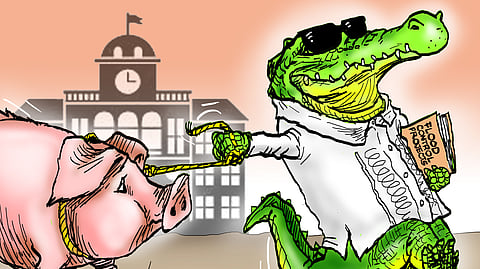
- NEWS
- the EDIT
- COMMENTARY
- BUSINESS
- LIFE
- SHOW
- ACTION
- GLOBAL GOALS
- SNAPS
- DYARYO TIRADA
- MORE

The ordeal of Oriental Mindoro Governor Bonz Dolor over a wholesale Department of Public Works and Highways (DPWH) pork project, where several legislators collected kickbacks, is typical among local officials who are now coming together to denounce the rotten collusion.
The local executive revealed information that may indicate a larger syndicate within the government than previously thought.
According to his account, local government units struggle to secure approval for projects and funds from the Department of Budget and Management (DBM). Yet, pork projects suddenly appear in his province.
To secure the release of P30 million from the Local Government Support Fund, numerous documents must be submitted, followed by a lengthy wait for approval in the electronic portal, according to Dolor.
“But these (flood control) projects — they just appeared. Many were not even in the National Expenditure Program. These were insertions. We don’t know who sponsored them because local government is not part of the budgetary process,” Dolor said, expressing his frustration.
He recalled that in 2019, local executives were directed to the Regional Development Councils for project endorsements.
Even if local officials endorsed projects, these weren’t funded, but instead funds were infused into projects “we never endorsed but that were already listed in the district and regional offices.”
He said that he raised with the DPWH the massive but crumbling flood-control structure in Barangay Mulawin, Oriental Mindoro in June, asking the DPWH regional director to improve it.
“I repeated the warning. Now, what I feared has happened — we’ve seen the collapse, the overpricing, and the substandard work. It’s now up to them,” Dolor said.
Oriental Mindoro is among the provinces where the “pass through” racket of legislators is believed to be prevalent.
Senator Ping Lacson mentioned that in the 2025 national budget, a small barangay in Oriental Mindoro was allocated P1.9 billion.
In all, Dolor came up with P39 billion set aside for his province that he was never informed about.
“I should be thankful because of the huge funding, but I regret that if only such huge funds were used properly, they could have solved our flooding problems,” he said.
A review of the projects showed that had they been done according to standards, “the cost per kilometer would be less than half.” Thus, the amounts indicated in the yearly budgets could have covered twice as many kilometers to stop flooding.
Bulacan, another province notorious for the pass-through conspiracy, had its governor, Daniel Fernando, also claiming that he was not privy to multibillion-peso projects.
The pass-through scam involves projects meant to obtain kickbacks being inserted into the yearly budget of implementing agencies such as the DPWH.
The legislator representing a district involved in the sliced-up project receives a “parking fee” of at least five percent of the budget. For instance, the P39 billion worth of Oriental Mindoro projects would mean a clean P2 billion for the collector of the parking fee.
Dolor said the dike project in his province had several contractors, implying that several members of Congress partook of it.
The pass-through scheme is a perfect crime since the crooks who received the most significant slices of the pie never signed anything unless they were also the contractors to maximize the capture of public money.
Crocodiles that snap up unwary prey whenever they want populate the halls of Congress, and the voters, sadly, had placed them there.
